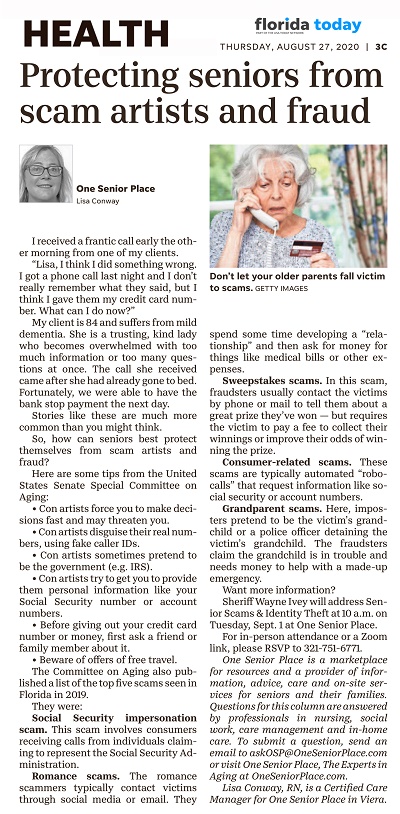
 Lisa Conway, One Senior Place – Special to FLORIDA TODAY
Lisa Conway, One Senior Place – Special to FLORIDA TODAY
This is a new Q&A feature provided by One Senior Place, a marketplace for resources and a provider of information, advice, care and on-site services for seniors and their families, located in Viera.

I received a frantic call early the other morning from one of my clients.
“Lisa, I think I did something wrong. I got a phone call last night and I don’t really remember what they said, but I think I gave them my credit card number. What can I do now?”
My client is 84 and suffers from mild dementia. She is a trusting, kind lady who becomes overwhelmed with too much information or too many questions at once. The call she received came after she had already gone to bed. Fortunately, we were able to have the bank stop payment the next day.
Stories like these are much more common than you might think.
So, how can seniors best protect themselves from scam artists and fraud?
Here are some tips from the United States Senate Special Committee on Aging:
• Con artists force you to make decisions fast and may threaten you.
• Con artists disguise their real numbers, using fake caller IDs.
• Con artists sometimes pretend to be the government (e.g. IRS).
• Con artists try to get you to provide them personal information like your Social Security number or account numbers.
• Before giving out your credit card number or money, first ask a friend or family member about it.
• Beware of offers of free travel.
The Committee on Aging also published a list of the top five scams seen in Florida in 2019.
They were:
Social Security impersonation scam. This scam involves consumers receiving calls from individuals claiming to represent the Social Security Administration.
Romance scams. The romance scammers typically contact victims through social media or email. They spend some time developing a “relationship” and then ask for money for things like medical bills or other expenses.
Sweepstakes scams. In this scam, fraudsters usually contact the victims by phone or mail to tell them about a great prize they’ve won — but requires the victim to pay a fee to collect their winnings or improve their odds of winning the prize.
Consumer-related scams. These scams are typically automated “robo-calls” that request information like social security or account numbers.
Grandparent scams. Here, imposters pretend to be the victim’s grandchild or a police officer detaining the victim’s grandchild. The fraudsters claim the grandchild is in trouble and needs money to help with a made-up emergency.
Want more information?
Sheriff Wayne Ivey will address Senior Scams & Identity Theft at 10 a.m. on Tuesday, Sept. 1 at One Senior Place.
For in-person attendance or a Zoom link, please RSVP to 321-751-6771.
# # #
One Senior Place is a marketplace for resources and a provider of information, advice, care and on-site services for seniors and their families. Questions for this column are answered by professionals in nursing, social work, care management and in-home care. To submit a question, send an email to askOSP@OneSeniorPlace.com or visit One Senior Place, The Experts in Aging at OneSeniorPlace.com.
Lisa Conway, RN, is a Certified Care Manager for One Senior Place in Viera.


